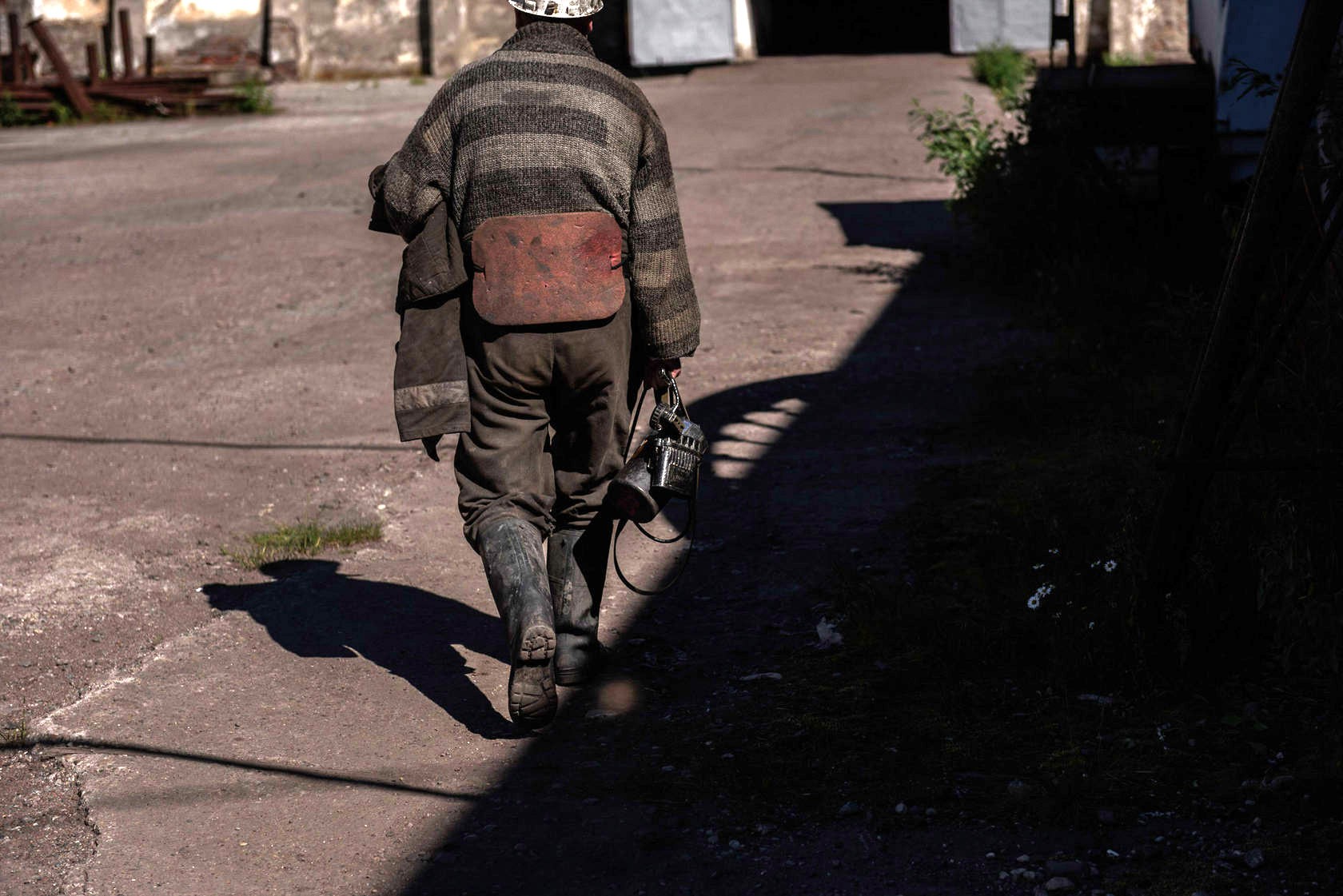
In the shadow of the coal miner
Text by Igor Sokolov
In early July 2018, the board of directors of the joint-stock company Intaugol after agreeing with the regional Komi government decided to close the enterprise and dismiss 1,200 people — almost every twentieth resident of the city. Journalists Igor Sokolov and Kirill Shuchalin from online magazine 7x7 went to Inta to talk with people and learn about their reaction to the announcement about the liquidation of the town-forming enterprise.
The dismissed miners were offered jobs in Vorkutaugol and other enterprises in the Severstal group. Some have already agreed, but most will decide to stay in Inta — they do not have the opportunity to move to another city or region. Over a two-day period the journalists met with both optimists who are sure that nothing negative will happen to the city, and with pessimists who believe that Inta without the mine will wither and become a small village. Many of the interlocutors — officials, employees of municipal institutions, entrepreneurs, workers — prefered to stay anonymous: they are afraid to lose their jobs, posts or business.
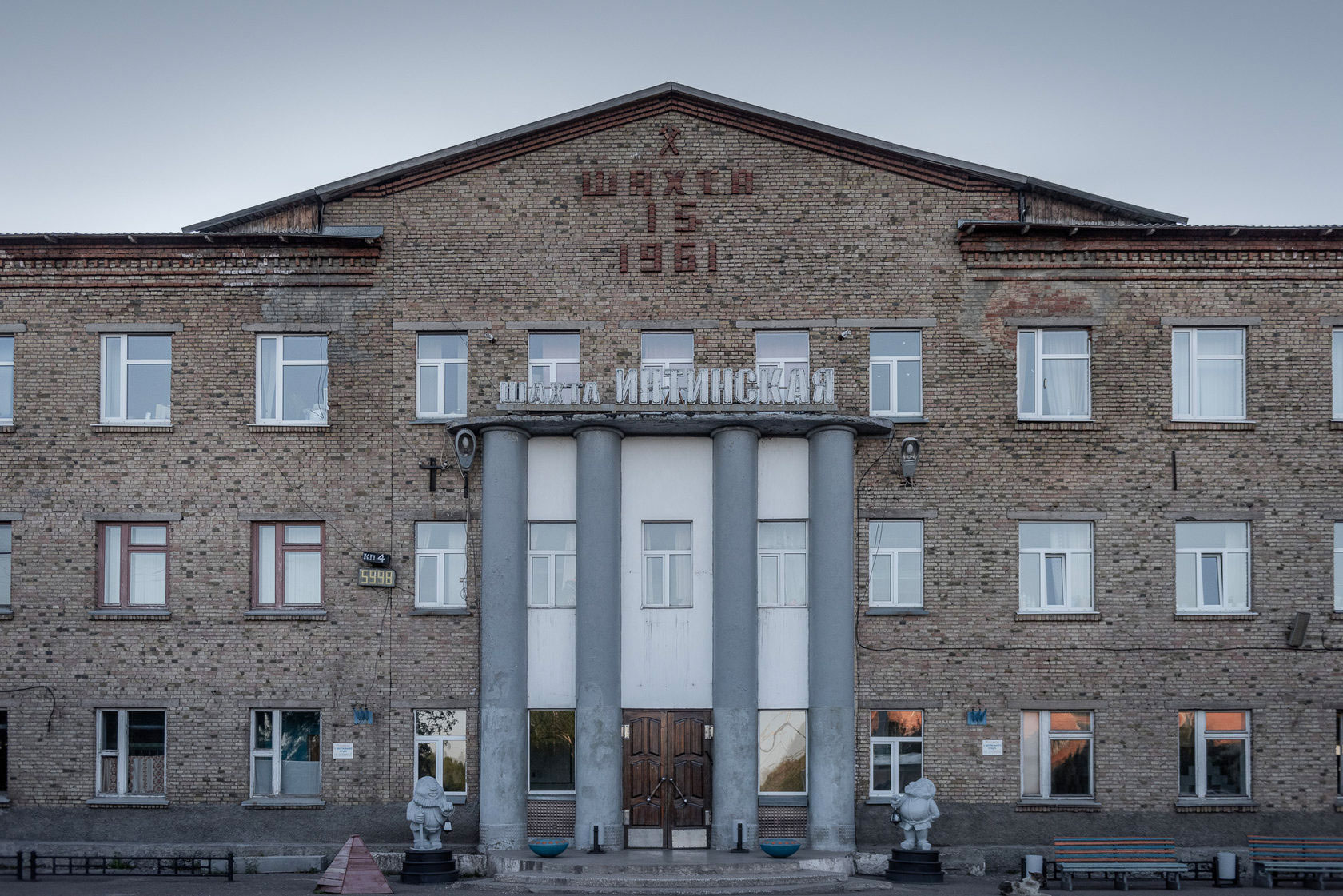
Destination Inta
There is no train to Inta — the station is located in the village of Verkhnyaya Inta, 12 kilometers from the town. When they decided to build a railway, no one knew where the coal seams were located in this area, and it was not safe to build a route over the future field. Therefore, they decided to move the railroad further away. Later, it was found out that the seams were in the vicinity of the village of Yuzhny, which is located much closer to the city. Thus, the station could be closer, and the taxi drivers would not charge 350 rubles for a one-way trip — almost ten times as much as the ticket for bus number 101.
ADVERTISEMENT
The bus arrives on time, in part its schedule is consistent with the arrival and departure of trains. The road from Verkhnyaya Inta to the city takes less than half an hour. Photographer Kirill and I are traveling in the middle of many willow trees, we can’t see anything, only sometimes some distant pipes and industrial buildings appear. Kirill looks out of the window in search for the mine Intinskaya — we know that it is somewhere near the city. At some point, a characteristic structure is shown among the thin trunks of the bush — an iron construction with a star on top. Kirill makes first shots and smiles — he feels that he has photographed something important. But it was not that mine at all.
In search of coal
At the downtown stop there is a commemorative plaque. It says that the discoverer of Inta coals was Ivan Sorvachev, a resident of the local village of Petrun. In 1910, he discovered the coal yield on the Great Inta River; in 1912, geologist Matafin studied these coals, and in 1915 the first collection of Inta coals got to the Geological Museum of the Academy of Sciences. Despite the fact that Sorvachev did not write any reports, but only sent parcels of coal to Moscow, it is he who they consider the discoverer of coal deposits. This patriotic version is promoted by the city museum of local lore.
Some scientists and local historians consider Andrey Zhuravsky to be the discoverer, who during the expedition in 1904 in the Komi region was engaged in geological research and found yields of brown coal. These data enabled the geologist Feodosy Chernyshev to theoretically calculate that there is a large coal deposit on the territory of Komi. But according to the official version, the discoverer is the geologist Alexander Chernov, who in 1924 first formulated the idea that in the north of the Komi region there is a huge coal basin. It is clear that by that time many already suspected and even knew about the deposit. Chernov actually came when everything was ready, officially confirmed everything and recorded it in the reports.
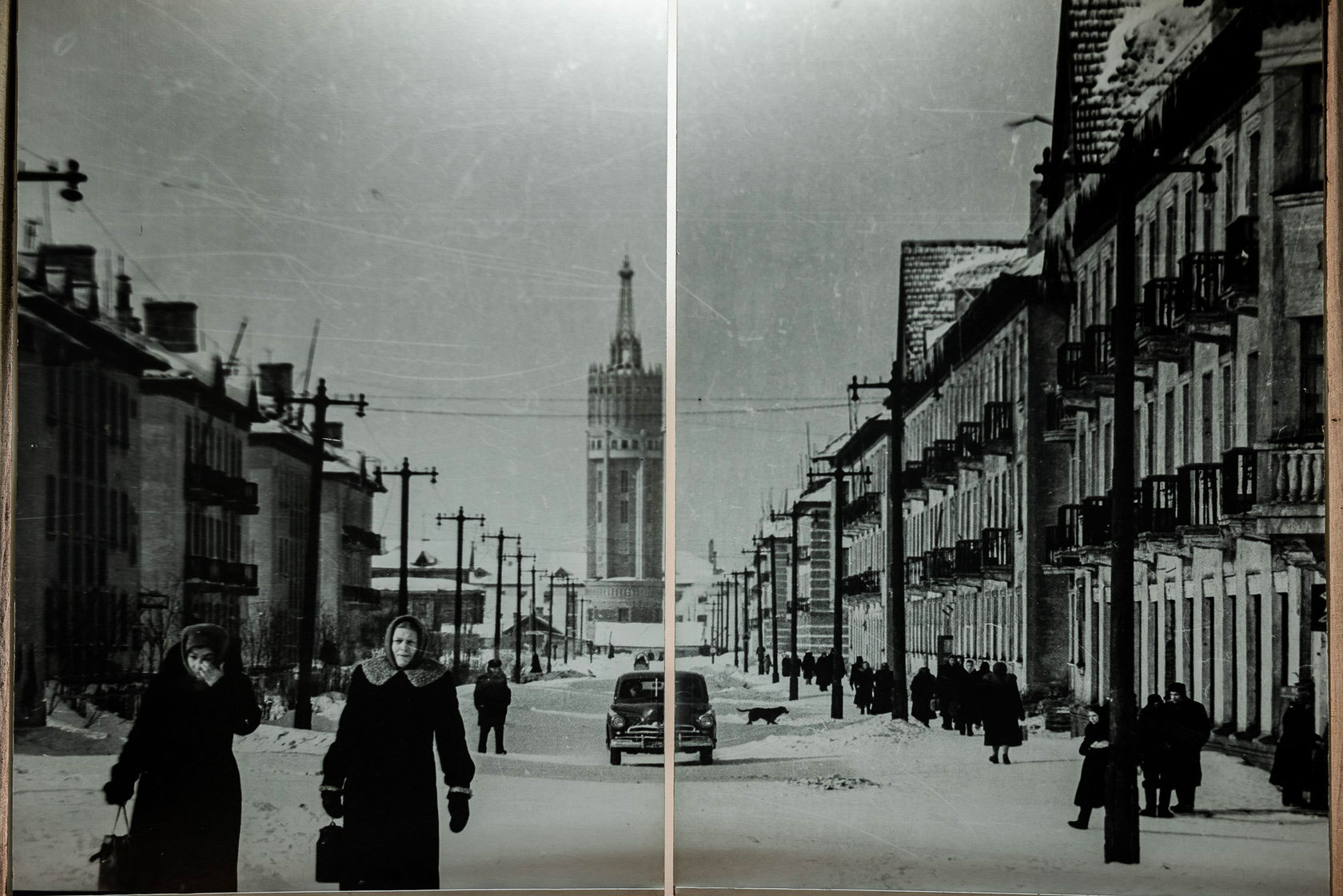
The development of the Inta coal field is inextricably linked with the repressed. Since 1931 in this area, prisoners of Ukhtpechlag were engaged in drilling and exploration of coal reserves. In 1938, Ukhtpechlag collapsed, Vorkutlag or Vorkutstroy were formed, and a unit on the Great Inta River was called «Rudnik». In 1938–1940, it was already known that there were large reserves of thermal coal. Vorkutstroy decided to lay the first three experimental mines to find out exactly where the coal seams are located. It turned out that there were 11 of them and they extended hundreds of kilometers, resembling a plate.
The first real mine was opened in 1941. It was called «Pioneer». And it was closed as late as in 1982. The development of the lower layers under the Pioneer was continued by the mine Glubokaya, it existed until 1998. In 2004–2007, the mines Zapadnaya, Kapitalnaya and Vostochnaya were closed. The only working mine remained — Intinskaya. With its liquidation in 2018, the history of the coal industry in Inta has ended.
The foothill tribe
In early 2010, two gnomes were installed next to Intinskaya; they were supposed to symbolize the work of underground workers. A year later, another meter sculpture appeared near the city administration. Later, fantasy characters were located next to the pedestrian street.
The mine is an important symbol of Inta. The image of the tower with a star on the spire is found everywhere: in the lining of buildings, in small architectural forms, in polygraphy.
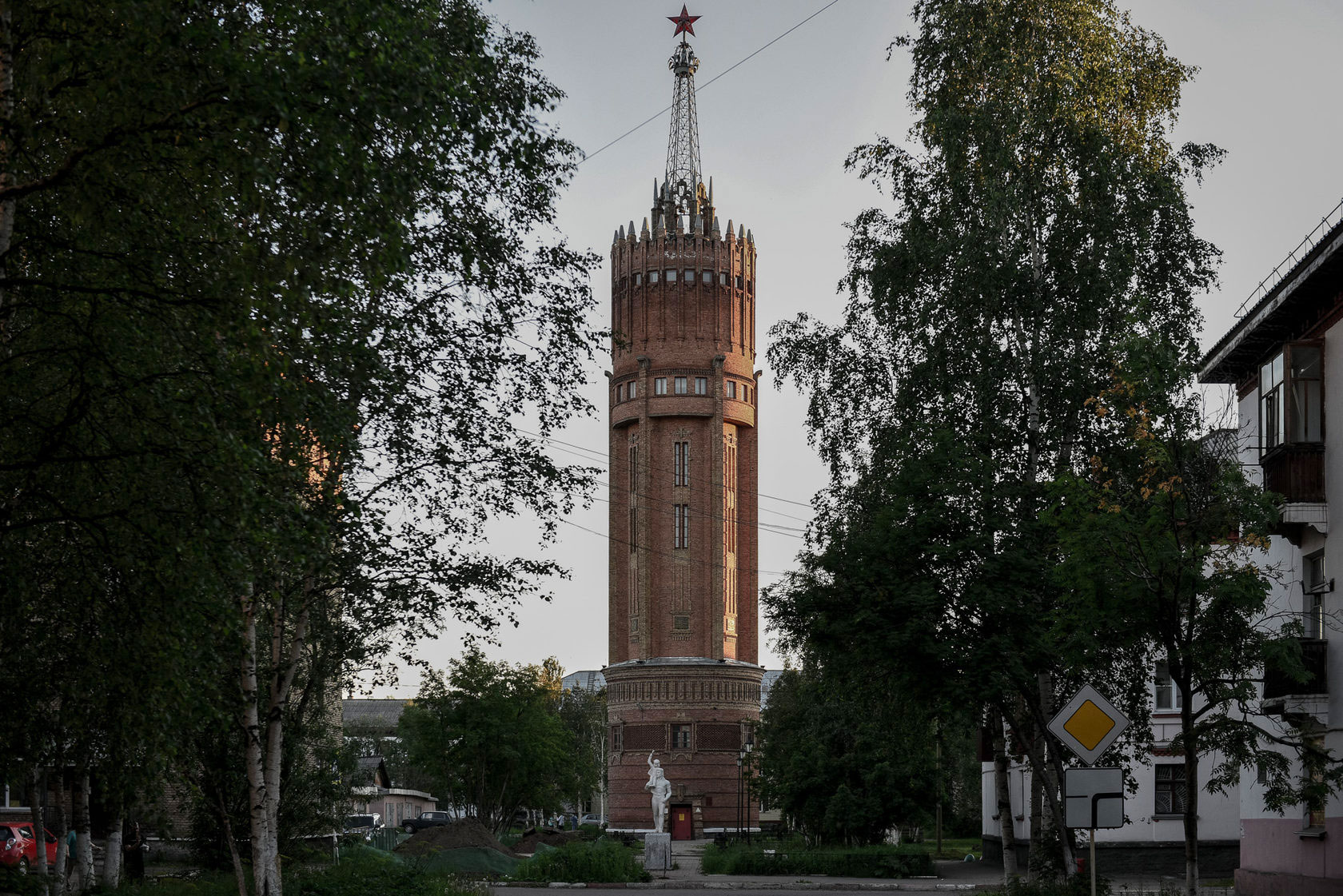
Even the official symbol of the city depicts a mine, which is a violation of heraldic norms. Therefore, the city has no approved coat of arms — just the emblem. Earlier, a local historian tells, the stars in the mines were turned on when the miners fulfilled their annual production plan ahead of schedule. As soon as all the mines fulfilled the state plan, the star on the water tower was turned on — the main architectural symbol of the city. According to the local historian, this happened in December, and people were always happy about it.
The flourishing of Inta took place in the 1970s — there were about 70 thousand inhabitants. Within a decade and a half before that, the city was intensively built up: new residential areas, wide streets, schools, sports facilities and industries appeared. After perestroika, a massive outflow of population began due to the closure of enterprises, and today there are approximately 26,000 people left.
In the beginning of the 2010s not only gnomes appeared in Inta. The whole country was engaged in branding at that time, so the former mayor of the city Pavel Smirnov requested to find the town’s own brand. By that time, Vorkuta was already the «capital of the world», Usinsk — the «oil capital of Komi», Ukhta — «the pearl of the North» (but local authorities began to promote the idea that Ukhta was the «homeland of Russian oil»), Pechora became the «soul of the republic». But nothing about Inta. The town hall organized a contest and gathered about 80 interesting and even funny phrases (for example, «Inta is a girl with a big heart»). But the slogan «Inta is the golden heart of Komi» won. This option was suggested by the Syktyvkar newspaper «Red Flag of the North» (years later, Smirnov, who is now convicted of bribery, confessed that he personally paid the editor-in-chief of the newspaper for creating a positive image about himself and the town).
Inta is the golden heart of Komi
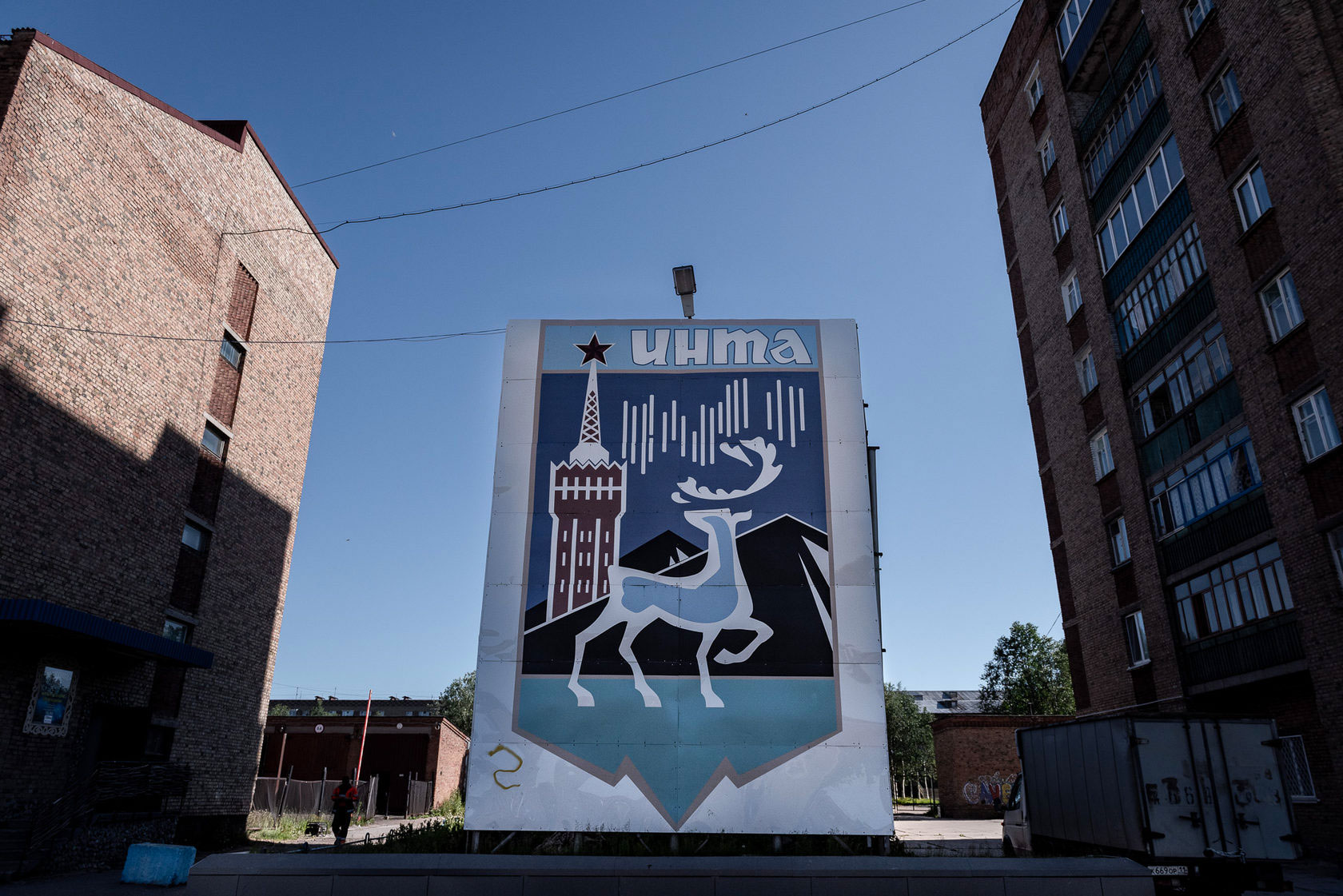
According to the organizers, the choice of this phrase was justified: they were going to extract gold on the territory of the municipality; besides all the Inta residents have such a mental feature as cordiality. The brand was approved, and the town hall actively promoted it: a heart-shaped inscription appeared on the arch, heart-felt articles in the local and republican press, an art object in the form of a heart. According to the local historian, the townspeople joked and ridiculed this phrase. And indeed — there was too little truth and too much political PR. But officially, no one refused.
Cosy town
«There is no job for people, ***. I swear. My guys drank themselves. I myself am a former miner. I worked everywhere: at Zapadnaya, at Intinskaya, at Vostochnaya. I am a fourth-class miner, an underground electrician. I retired at the age of 45. I haven’t work for five years already. I was born in 1968, Monkey year,» Mikhail says abruptly. He sits on the porch near the laundry, which is located in the basement of an apartment building.
The man looks untidy and, apparently, is suffering from a usual hangover. The owner of the laundry Olga is standing next to him. Michael asks where we came from.
«From Syktyvkar.»
«How’s aunt Irina doing? And how is uncle Misha? Still rules the conservatory?
«Gertzman?» photographer Kirill asks.
«Gertzman! My sister owns an Izhma house in Ust-Sysolsk. She is from Izhma. You know what? Uncle Vasya Rochev [skier, Olympic champion] is my relative. Valera Leontiev [famous singer] is also my relative. Ukhta, ***, two pipes and Lenin in the middle. In Sosnogorsk, there is a railway uchebka [technical school]. Was the station repaired there?»
«Not yet. Only in Knyazhpogost.»
«I’m single. Cops *** [beat] me yesterday. They painted their house in the Pink Panther. Did you see the cops? They have a pink building. My guys are Afghans [veterans of the Afghan war]. Do you know Fedor Fedorovich? Director of the sports palace. He is my sports coach,» Mikhail continues to give names, and it turns out that he is in kinship and friendship with the former mayor of Inta Vladimir Weygandt, with «the chief of the city relations», with the head physician, criminal authorities, rich neighbors. «I am so thirsty.»
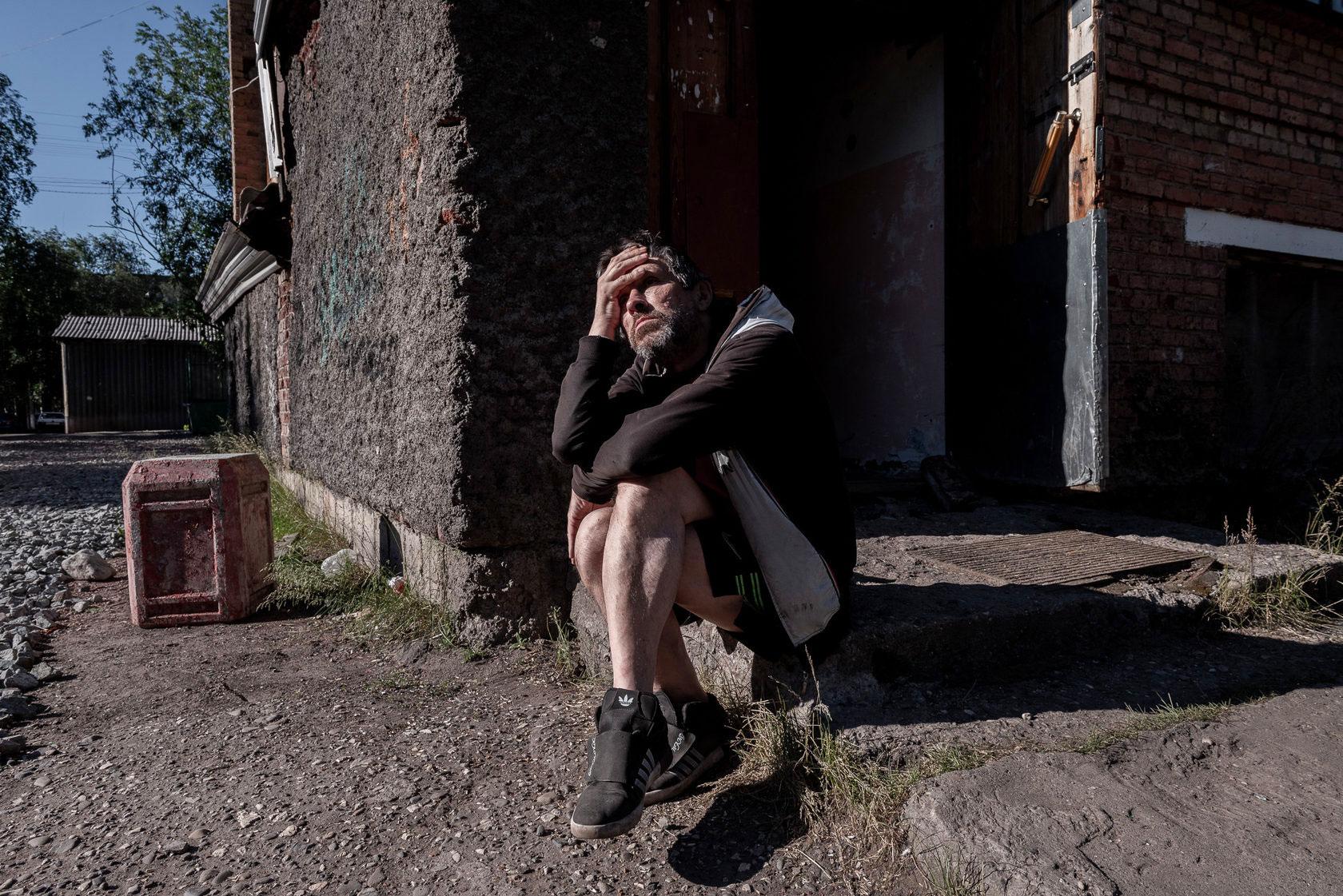
Olga goes down to the laundry for a glass of water.
«I’m really worried,» Olga says when she returns, regarding the closure of Intinskaya.
«Where will people work?» Mikhail asks her. It seems he can say something thoughtful again.
«Yes, no job,» Olga sighs. «People drink themselves.»
«Families get divorced,» Mikhail continues.
«Get divorced, but they have to pay alimony. And they can’t,» Olga agrees. «I’m worried. And I really like the town — it’s clean.»
«Cozy,» Mikhail says.
«Compact, sporty,» Olga adds.
«It’s very nice here, but I would have left so long ago. Quiet, calm little town. The cleanest in Komi. Here people are very nice, good-natured. I’ve been working with clients for 20 years — I really like them. It’s kind of sad to leave. Good afternoon, honey,» suddenly exclaims Olga seeing a client arrived by a taxi.
It’s very nice here, but I would have left so long ago.
Olga can not leave. In the queue for resettlement, she is «six thousand something», and 200 thousand rubles from sale of her Inta apartment is not enough for her neither to move nor to buy new housing (real estate in Inta was one of the cheapest in the region, and after the announcement of closing of the last mine prices even declined).
«I came here as a girl. I was 22 years old, after the institute, as a young specialist. But the tundra sucked. And there was nowhere to go. But what a town it was before! Now people are all afraid to talk. Afraid to lose their jobs. Just as I do. I’m afraid to stay on the street. And it will happen. There are pubs on every corner. Pharmacies and pubs — everything we need: get drunk, feel bad, have a headache, go to the pharmacy. And we are waiting for more discounts to buy something for a headache and blood pressure. No prospect.»
Now people are all afraid to talk. Afraid to lose their jobs. Just as I do. I’m afraid to stay on the street

Hope for continuation
Next to the laundry there is a two-story brick building. Previously, there was a kindergarten, but due to the fact that there are fewer and fewer children in the city, the pre-school facility was closed and the building was transferred to the ecological center. The building is under reconstruction — they are preparing to move in.
As we talk with Olga and Mikhail, the jeep of the director of the local youth environmental center Vasily Petrov approaches the gate of the former garden. His assistant opens the gate, and together we go to the territory of the children’s environmental center. Mikhail, circling around us like an harlequin, immediately goes to the dumped things: old desks, broken toys, furniture, building materials, plumbing.
«The town is gradually degrading. The number of children decreases, everything becomes less attractive. So, the building is free now. In order not to lose it, it was given to us. There are a lot of rooms and appliances. Virtually all kindergartens that have been closed are preserved. Who knows, maybe tomorrow the away team arrives and the gardens will have to be opened again,» Vasily Petrov says.
«What team? Children’s? Military?» We do not understand.
Mikhail sits down in front of the large calculating frame and moves the dibs from side to side. It seem like it adds up.
«The city to date, let’s say, is one of the best in terms of infrastructure. We have everything: there are schools, there are kindergartens, gyms, swimming pools, three: one is specifically for preschoolers, one is commercial, another is free. There is a base here. I guess, gas specialists will soon come,» the head of the environmental center explains.
At this moment Mikhail comes up to us. In his hands he holds a mirror.
«Do you know our chief?» He gets into the conversation. Perhaps, he was going to list some acquaintances again, but this time, apparently, he began with the mayor Larisa Titovets.
«I’ll arrest you,» Vasily Petrov tells him, pointing to the man’s find.
«Why? It was lying around.
«Not lying, but neatly stacked. Go away!»
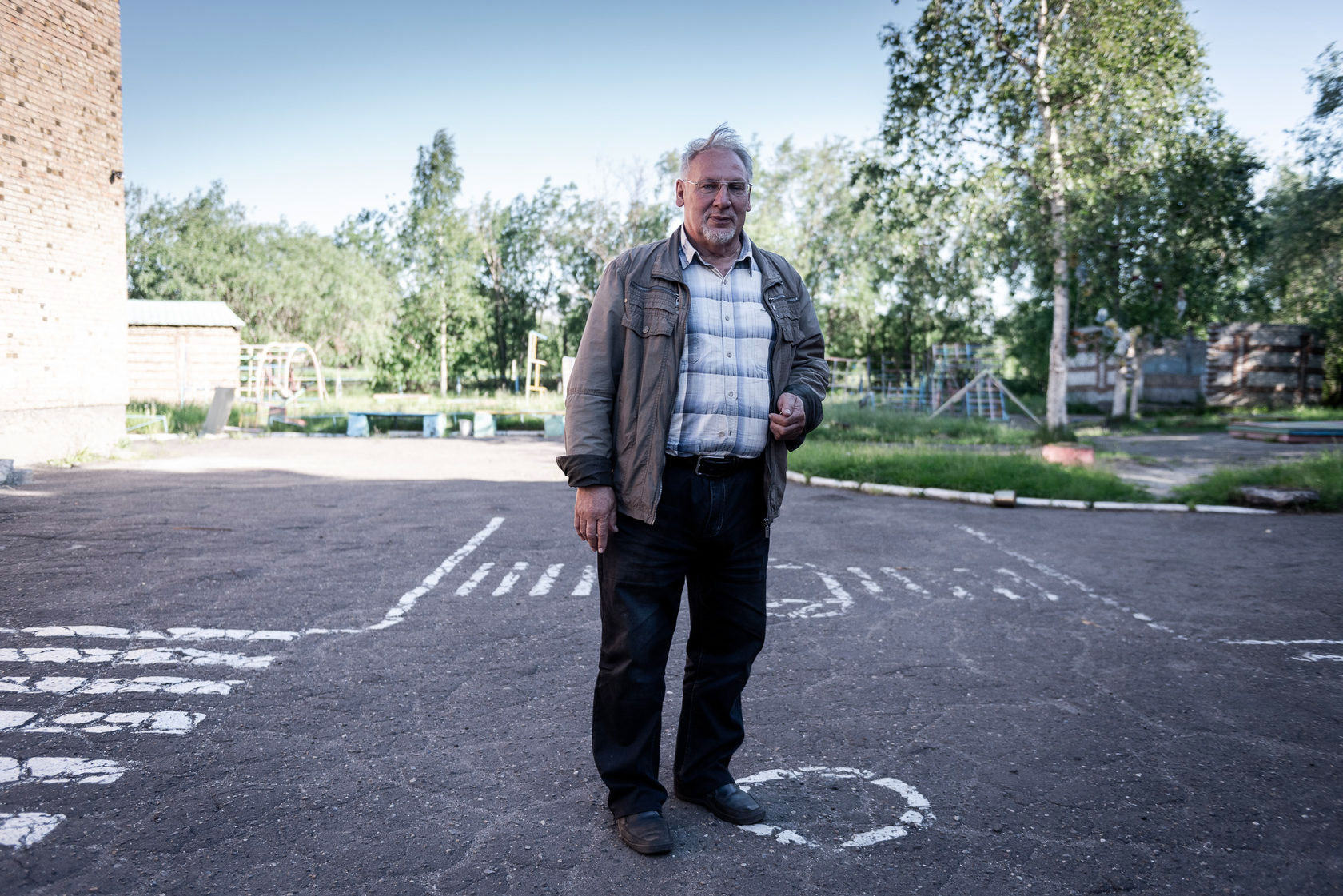
Inside the building there is an orderly mess: painted night pots are hanging to the wall, stacks of books rise in skyscrapers in the middle of the room, rare Soviet games in boxes will soon become garbage, collections of minerals await moving to another place. The building is already under construction — the builders have put the shelves for the cages with rodents. Built-in cabinets will replace the compartments with birds — the niches in the walls are perfect for this. It is noteworthy that the director of the station is glad to see the changes. He wants to create something, he is proud that his environmental center will be the best in Komi — at least by the number of species of animals, birds and reptiles.
Vasily Petrov is sure that nothing bad will happen to Inta — the town will live on, despite the consolidation, reduction and liquidation of enterprises.
Optimization course
Every year, 700–800 people leave Inta. Unofficial figures on out-migration are larger. According to the Inta resident Nikolay, the town does not have prospects without creation of new workplaces.
«Pupils finish school here and go to the high schools. They get a specialty, they live in a big city, get married there, but they need jobs to return here. And we have a population decline. Staffing hunger exists.»
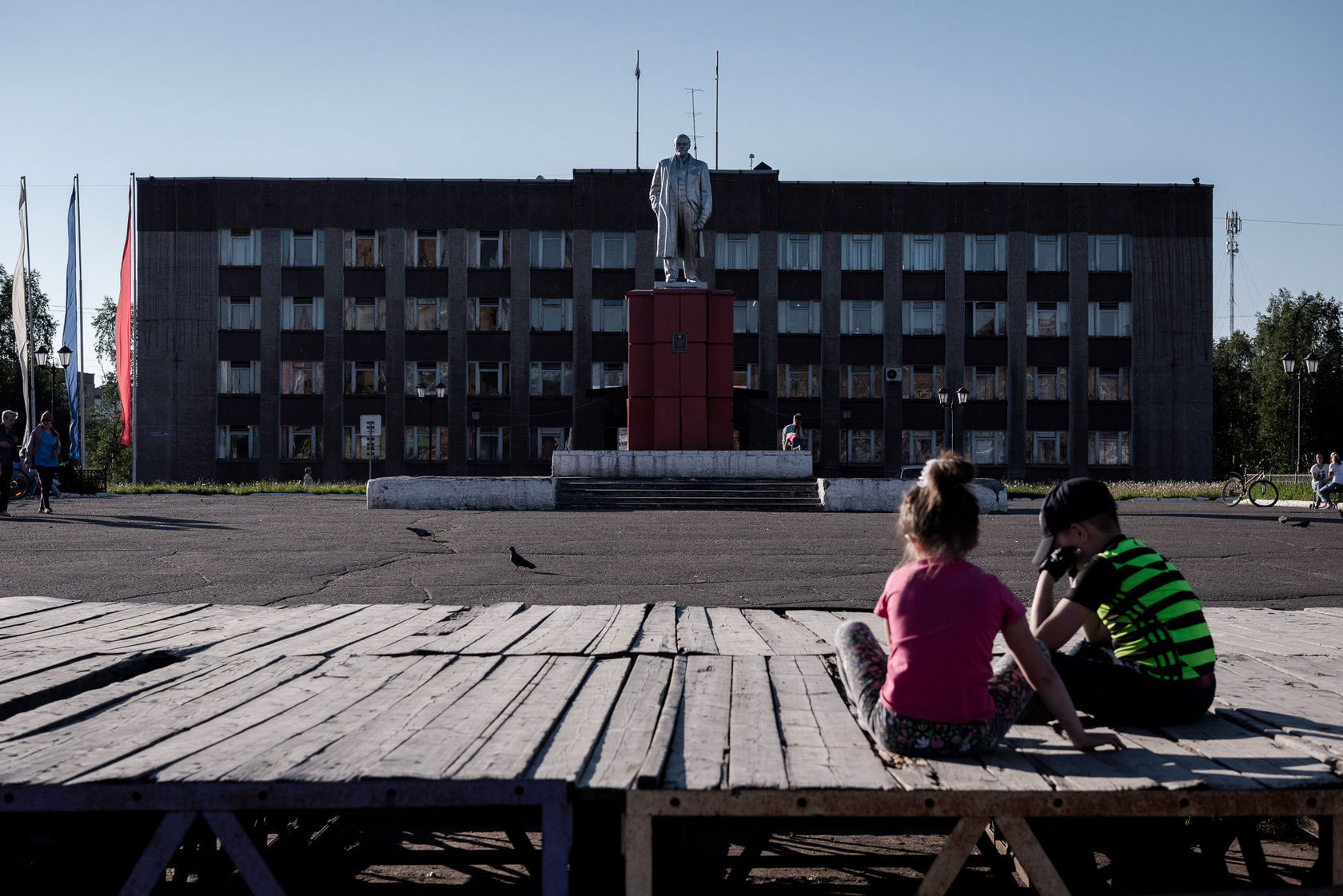
The population decline affects the entire social infrastructure.
«People are leaving. One kindergarten was closed, the children were transferred to others. And then we calculated that even after that there were 440 vacant places. For the same reason, school No. 3 was closed. It is designed for 400 people, but only 67 children studied there,» says an employee of the Inta administration.
According to him, the mayor’s office is purposefully engaged in spending cuts and optimizing the municipal fund. Otherwise, the city simply can not keep empty objects and full staff of employees. But the actions of the administration head Larisa Titovets are not approved by all, although there is logic in it.
«Liquidator» — this is how the employee of one of the budgetary institutions calls the mayor.
«We appointed the mayor, so she would close everything? She is a very administrative person. Closed everything. This is unprofitable, that is unprofitable — everything is unprofitable. And then what is cost-effective? For us, taxpayers, it is also unprofitable to provide an administrative apparatus. But no one listens to the masses,» says the employee of Intaugol Lyubov.
Not only kindergartens and school are closed. The local municipal boiler-house is closed. People are afraid that the poultry farm will be closed. Inta citizens have a rumor that the bread-making plant will be closed.
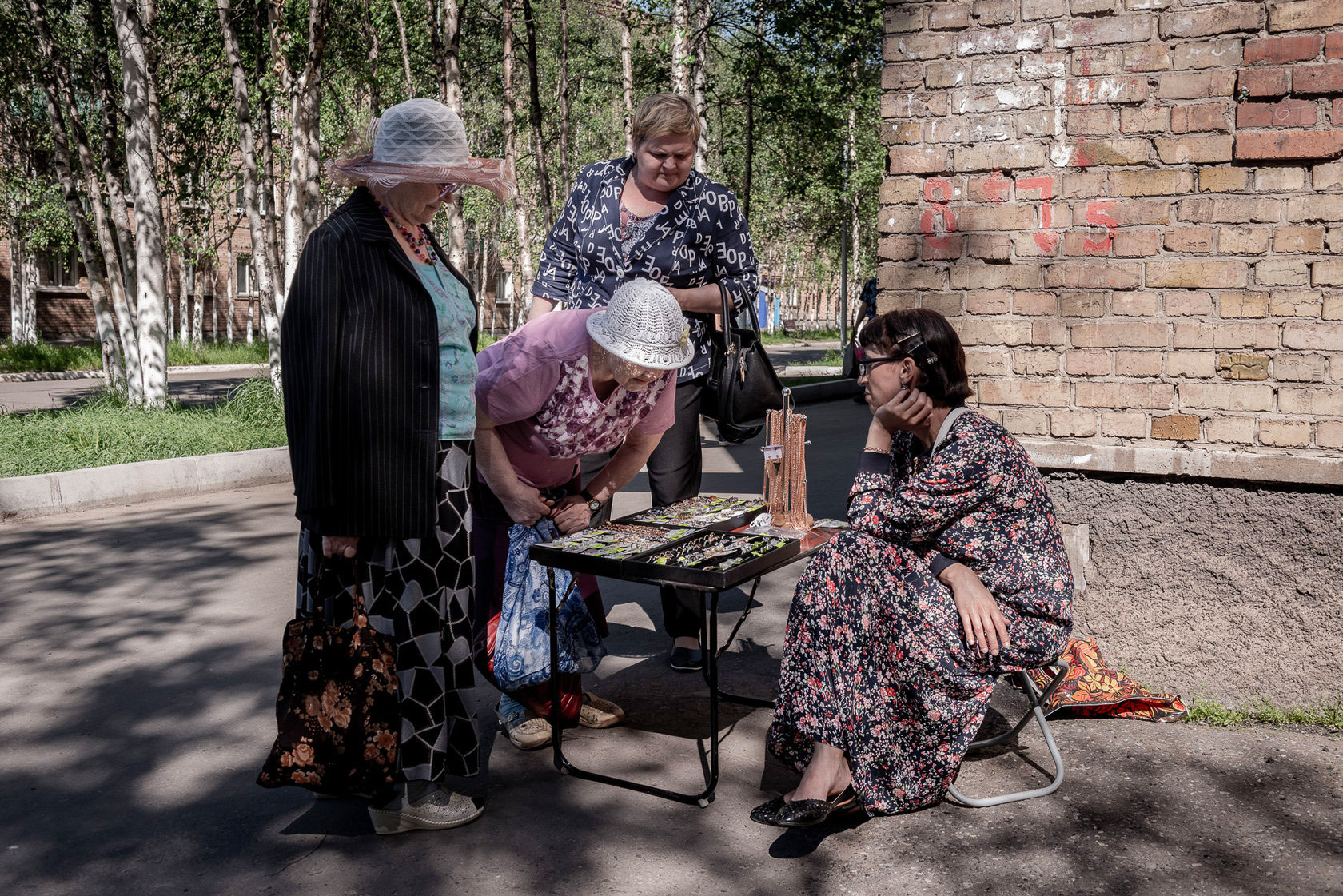
Clean town
In 2016, the head of the administration Pavel Smirnov announced that Inta will claim the title of the cleanest city in Russia. He was the initiator of days of cleanliness, constant «subbotniks» and actions for improvement. He also ordered to put reinforced concrete slabs in the yards of apartment buildings.
«He made bus stops. Well done! The fence is also his brainchild,» Dmitry, who worked in the housing and communal services sector, points to the fence along one of the roads. «He did something, I agree. But how much corruption was there… For example, all the slabs that are put in the yards. If the organization bought the slab at the factory of reinforced concrete products, it costed 30 thousand rubles. In fact, the price of the slab was eight thousand. From these 30 thousand, five [thousand] rubles went into the pockets.»
Slabs are still put in the yards. In this city project aesthetics have won practicality — the territory really looks unrealistically clean and spacious. In the modern part of the city, the yards practically do not differ from each other: the same type of brick houses, the same drawings on the entrances, the urns, fences, benches, rare passers-by.
In one of the courtyards, an employee of a local management company was mowing grass, the remaining five were traditionally sitting on a bench and smoking. When Kirill pointed a camera at them, a group of workers jumped up like a flock of sparrows at the sight of a cat.
«They do not like to be photographed,» says the woman who came up to us, although, rather, they do not like to be photographed not working. The absence of an orange vest indicates the crew chief.
«You have a very clean town, unike Syktyvkar,» Kirill starts conversation.
«Thank you. We are trying. We just finished with the curbs. Did you see what we did in the yard at Kuratova, 19?»
«Not yet.»
«You should definitely have a look. It’s beautiful!»
All the urns in the town are painted in bright red color. The town of red urns — that’s how you just want to call Inta. And it is obvious that the improvement here is purposeful, apparently, they believe that comfort in part reduces the overall level of depressiveness.
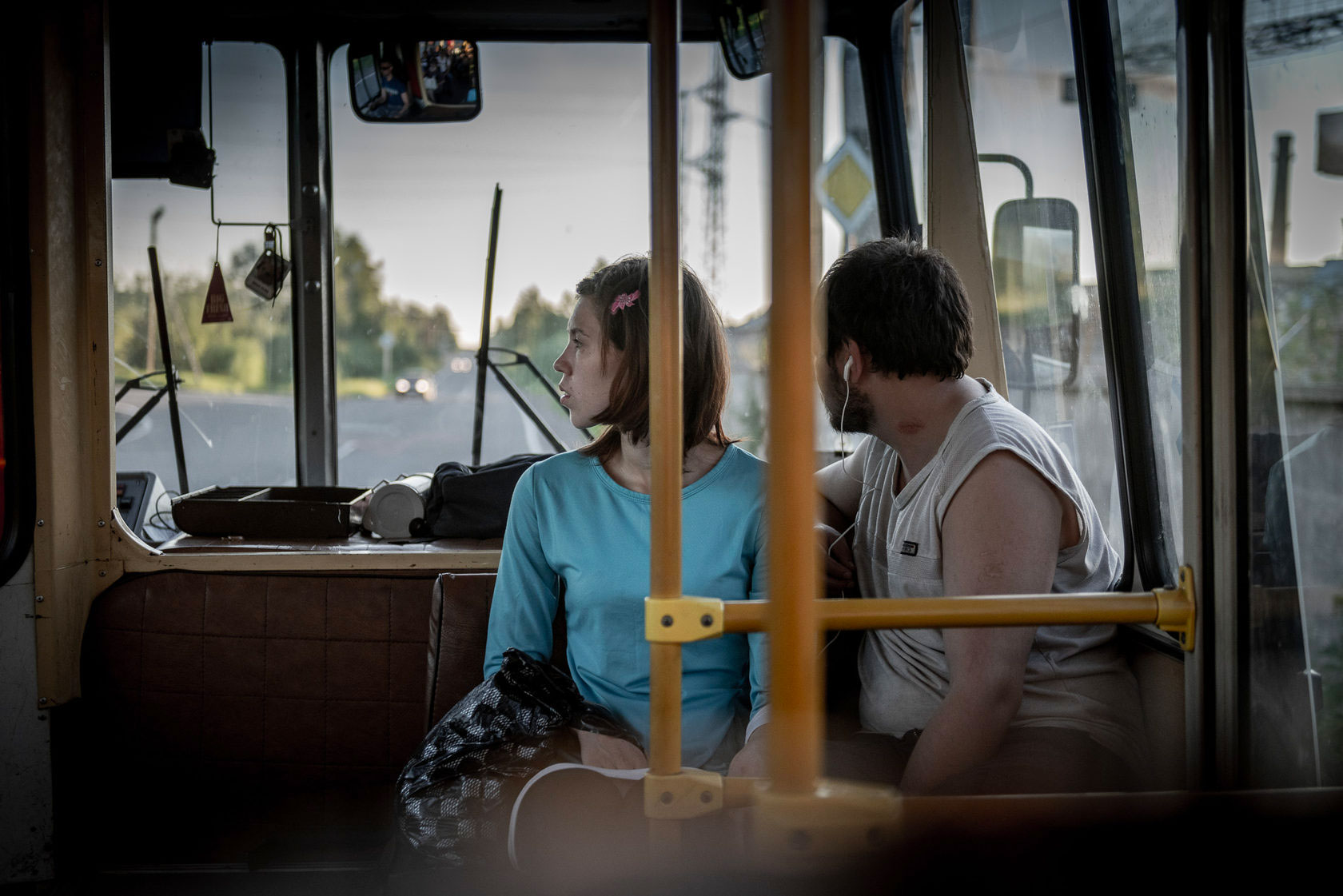
There are not many people on the streets. On a sunny weekday, the main square is crossed by the very few. From the step of the monument to Lenin, teenage traceurs jump near the city administration, rolling in the air. On the benches, there are several women with carriages. There is no one at the tent with popcorn. The table for playing ping-pong and the hockey box look like alien elements. Just one girl on the merry-go-round. Two children are jumping on an inflatable trampoline. In the evening, there are more walking people, but we can’t help feeling someone is missing. And there are a lot of such people.
«One autumn my husband and I walked along the main street, it was already about eight in the evening. And half the windows in the houses were without light. So, there was no one there, but families should have supper there, should do things after work. And you see, there are no people at all. This is so scary,» says Nadezhda, in whose apartment we stayed during this trip.
The mosquito kingdom and a hogweed
Together with Kirill we are standing at a bus stop in the old part of the town and talk with the locals. Flies, gadflies and mosquitoes fly around us. There are a lot of them: you pass your palm over your hand, like a blade of a tractor, unloading the top layer of insects, and others have already taken their place. This is how communication takes place — everyone beats himself on the face, shoulders, neck, legs non-stop. Bloodsuckers are not becoming fewer. Some local residents say that there are more mosquitoes because of the willow, the enemy surrounding the city and gradually capturing all new streets and wastelands. Others associate this with global warming. Indeed, the climate is changing, and in the vicinity of Inta, scientists began to observe animals and birds, which were never there. Even hogweed is already settled in Inta, but here it still does not grow to two meters, looks like a rickety child compared to Syktyvkar monsters.
Vasily Petrov from the youth environmental station says that valuable minerals in large amount are formed in the places of underground tension and folding. Inta is located in such a place, and a small lowland and protrusion of the Ural mountains from the south create unique weather conditions.
«For example, the wind blows in Vorkuta, but it does not reach us. Why? Because it rises. If we were flying on airplanes, we would pay attention to an unusual phenomenon: the entire republic is covered by clouds, and Inta is open. Or vice versa: the entire republic is open, and in Inta the sky is completely covered by clouds,» he says. We could not check it: on that day it was hot and sunny in the republic, and only mosquitoes made the place unique, which did not seem bothered by the heat.
Housemates
In one of the courtyards, Kirill photographs a disassembled car. At this moment, we hear someone knocking on the glass — we see a man in a t-shirt with a kitchen knife in his hand in the first floor window. He swears — obviously he is not happy about the actions of the photographer.
«I will come out right now,» the stranger screams through the open window.
«Come out,» Kirill answers coolly.
«Let’s go, shall we? We shoud not mess with him,» I ask the photographer. It remains to be seen how the conversation with the aggressively-minded man ends, who has a knife as an argument.
As soon as he appears, Kirill immediately offers a handshake and introduces himself. There is no more conflict.
Sergey works as a poultryman, but he does not like his job.
«We have an average salary of 15 thousand rubles. Previously, the «northern» [Northern allowance] were added to the bonus, but now only to the salary. They pay this or that way. And somehow the average around the city is 22 thousand. And as for the rest, it sucks. We do not have a damn thing here. Сommunalka [utility services payments] is higher than in Moscow and St. Petersburg. I pay 7,5 thousand for 97 square meters. It’s very bad here. There are no earnings. There are a lot of debts. You can write in the article: there is no money for repairs,» he says, pointing to the half-decayed corpse of the Lada.
Another Sergey joins the conversation. He holds a bunch of car keys — he is going to the gym.
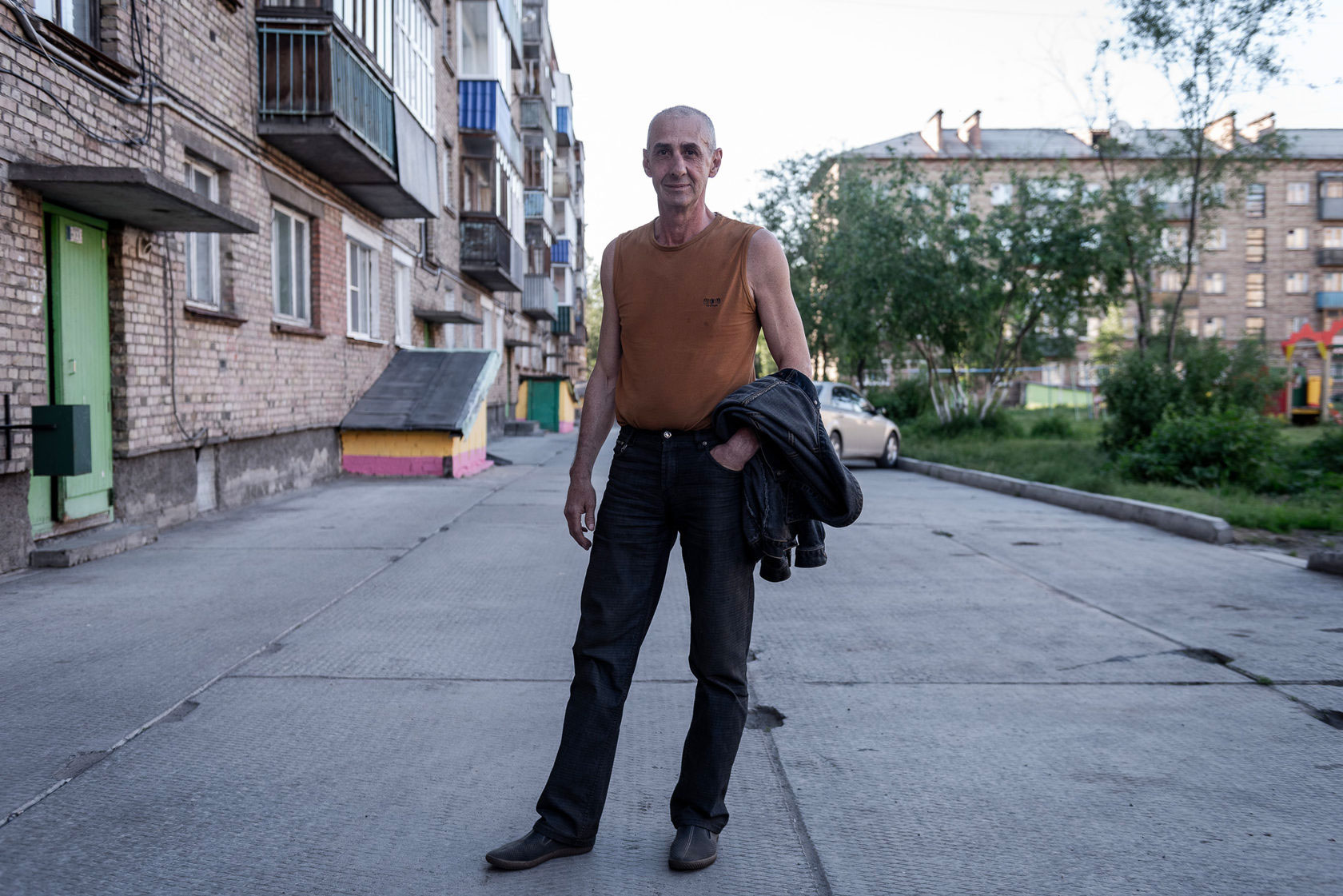
«Let’s say, we, retirees, do not have problems. I get 19 thousand. For the apartment I give 4-5 thousand. And I am alone. But Seryoga does not receive a pension. There is no job, there is nothing, a poultryman receives a penny. And I do not care if there is no job — I will still be paid a pension. I have not worked for 15 years. I was a miner. Let them close the mine and make a settlement out of the city,» he says smiling.
Another neighbor comes up. Denis works at the water canal. He is also confident that Inta will eventually lose the status of city and become a type of settlement.
«To put it mildly, the situation is a mess. Great payments came from the mine, because the mine was the main consumer of the water canal. There are no prospects here anymore. Despite the fact that, according to the administration, there are all kinds of deposits — gas, oil, diamonds, manganese. I doubt that something will be here — just rumors.»
Poultryman Sergey asks Denis for a cigarette, he answers: «Don’t have any.»
Mine: money and people
There is a bus No.3 to the Intinskaya mine. The trip lasts about 20 minutes, along the way there are suburban settlements. In the evening, at the stops along the broken road, young people gather; some bold teenagers on bicycles ride close to the bus on purpose, circling a lot of pits and potholes. Probably, this is some kind of a local entertainment.
Kirill is sure that in the rays of the evening sun the mine should look very beautiful. The bus stops near a large administrative building. The only ones who meet us are dogs and a portrait of Putin on the side of a low building. Neither dogs nor Putin show any interest in us.

While Kirill is taking pictures, I talk to the lift engine driver Lyubov. She does not know if coal is being mined now, although people go down and up every day.
«This is, probably, the end. Of course, everyone wanted everything to be all right. When there was Smirnov, he kept the mine. And now everything is being closed: the kindergartens are closed, the school is closed, the enterprises are closed. And where should people work? If it will be closed, where will people work? Vorkuta is suggested, but not everyone can go to Vorkuta. This is for the youth. And what about pensioners? I do not even know what to do.»
This is, probably, the end. Of course, everyone wanted everything to be all right
This year, Lyubov will turn 63 years old, she has long been retired, but continues to work. Her experience on Intinskaya is 37 years, another three years — on Zapadnaya. In the queue for resettlement she is in the 12th thousands and does not believe that she will ever be able to get a certificate.
«Is it so easy to throw people out of the enterprise? I have nothing — only one-room apartment. Where should I go? It would be possible to leave for resettlement,» says Lyubov.
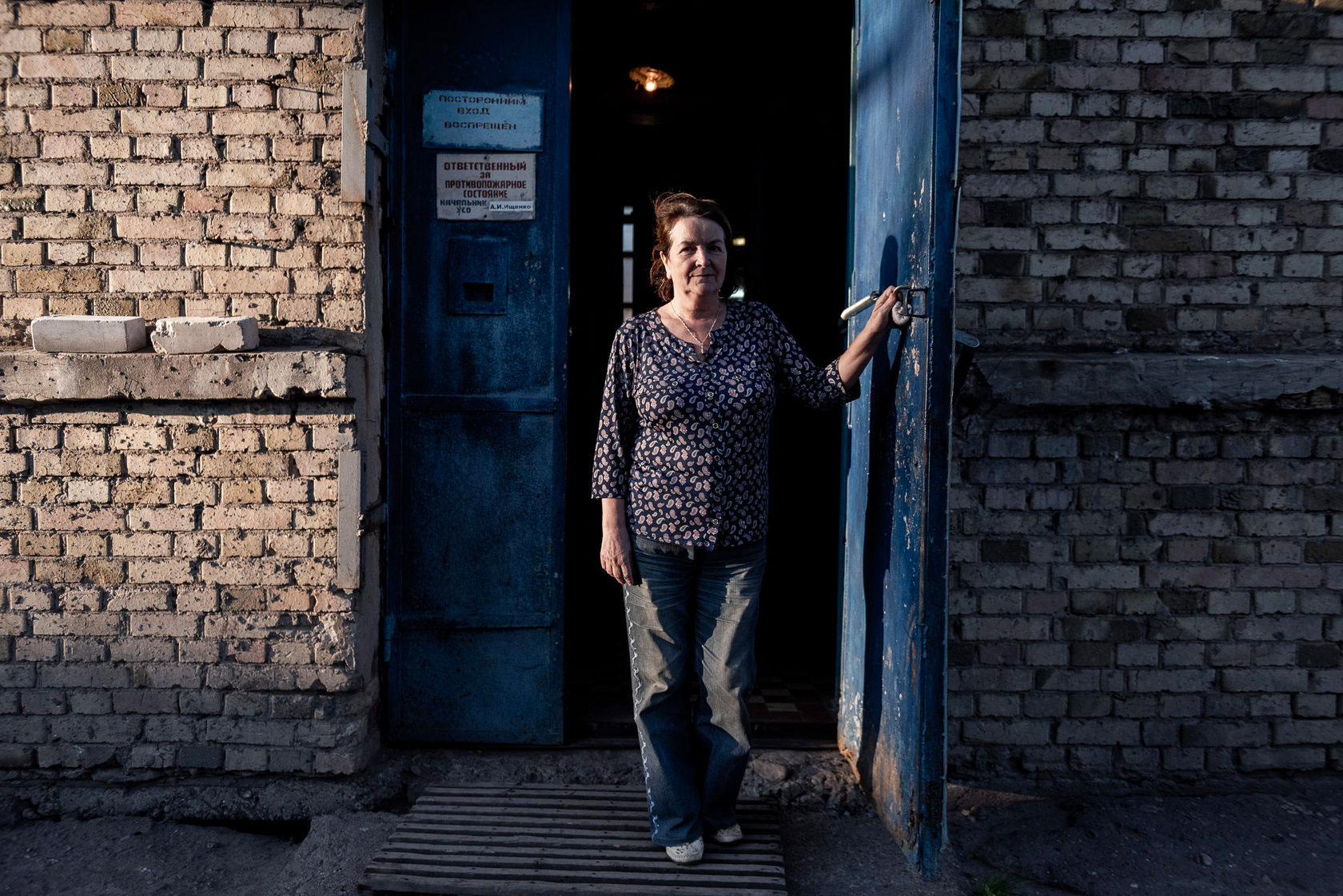
«It’s a shame for the enterprise. I have been working here for so many years. And everyone goes away. Dobychin [Dmitry Dobychin, who managed «Intaugol» for almost ten years — until 2015] said: «I’ll raise the longwall face, give it to me,» he beat his chest. He started and immediately left. And a longwall face will end soon. They opened a new one, it’s normal. But in parallel it is necessary to develop another longwall face, but there are no possibilities. We have an old harvester. There are no means to buy a new one. There was a combine harvester, but it was leased. I did not even know what it was. Those people who were engaged in the lease arrived and took it away. Probably, now they took it for lease again to launch the 843rd longwall face.
She advises to come to the mine in the morning to find the miners after the first shift.
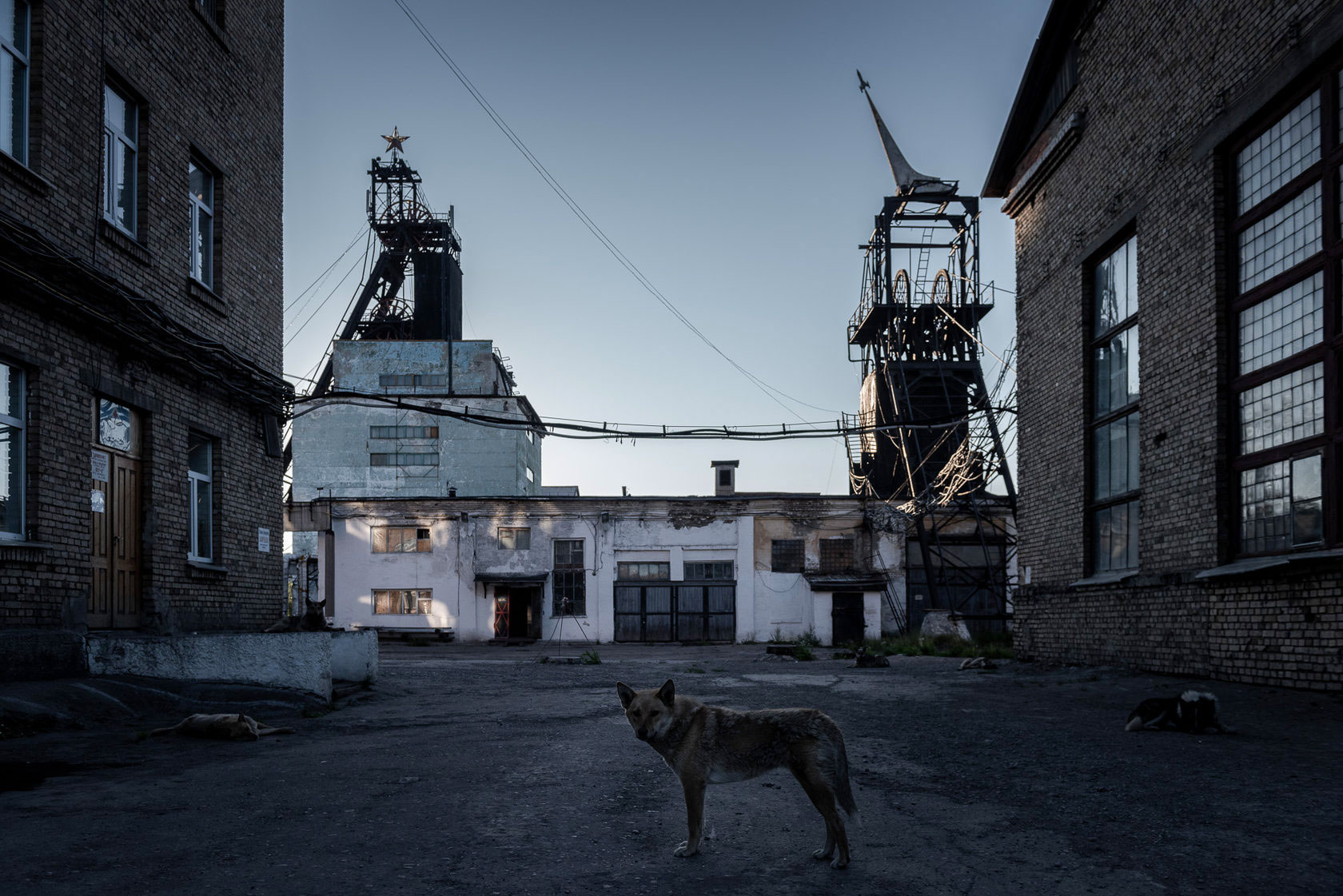
Energy coal
Inta mines extracted energy coal. And local coal contained a lot of sulfur and solid. Even after the mining processing plant 28 kilograms out of 100 will remain. Therefore, unlike coking Vorkuta coal, Inta coal is only suitable for heating. From Inta, coal was supplied throughout Komi, to the Vologda, Arkhangelsk, Murmansk and Leningrad regions and even to Finland and Hungary.
After the collapse of the Soviet Union, where the coal industry was centralized, the laws of the market entered into force: buyers sought to buy coal cheaper, and new owners of mines — to save on production and minimize costs. The head of the Kuzbass region Aman Tuleyev, in times of Yeltsin, was able to ensure that the transportation of his coal by rail was concessional. The Republic of Komi did not receive such preferences from the Russian Railways. And if the Vorkuta mines could withstand competition due to quality products, then for Inta it became a big problem.
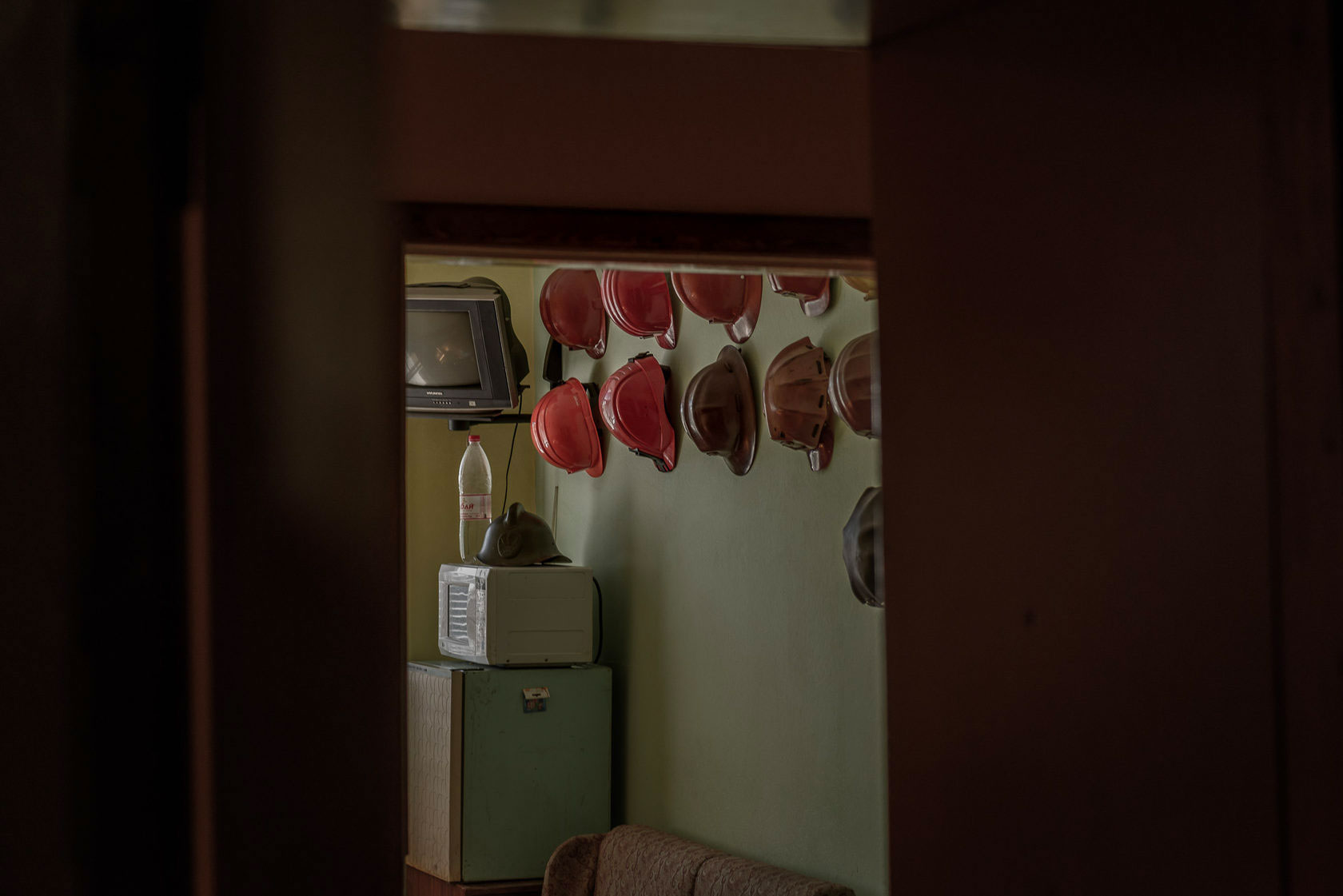
Intinskaya is a mine-longwall. That is, the company develops one longwall face, which creates production risks. If there is only one set of equipment, it is impossible to simultaneously extract coal in one longwall face and develop the next. Hence the inevitable downtime. In holdings or associations of mines, the work is planned differently: while some miners cut the seam, others prepare the next longwall face.
Intinskaya CHPP and municipal boiler-houses were tooled for the local coal. The boilers, the thickness of the tubes, their dimensions, the number of tubes in the boilers — everything was calculated for the temperature of burning of Inta coal. Inta coal was also used by the Cherepovets state district power station.
Closing logic
Almost 70% of the coal produced at Intinskaya was branded by the DShS (the so-called drop-off, a small, fast-burning fraction, like dust). In 2018, the prime cost of mining one ton of coal at Intinskaya was 970 rubles, while Cherepovets SDPS bought it for 570 rubles, that means, every ton produced brought 400 rubles of loss to the mine. In fact, the company accumulated debts, which were covered by the state Corporation for Development of the Republic of Komi. If the mine continued to work in the former regime, then by the end of the year the minimum amount of losses would have amounted to 480 million rubles. Therefore, the board of directors decided to close the enterprise and dismiss all employees.
«Such decisions are not accidentally adopted. Obviously, it was planned, even predictable. The planned loss-making process could not be invisible. The mine has consistently shown a billion rubles of losses per year, and you do not have to be a great economist to see it,» says an Inta administration official. «And when a block of shares worth 1.2 billion could not be sold for 450 million, there could be no other solution.»
Received in December 2017, 1.2 billion rubles from the federal reserve fund went to pay debts to employees and to launch the 843rd longwall face. All last year, republican officials said they were looking for an investor who would have invested five billion rubles in the mine and would be able to deduce a zero payback when mining at least three million tons a year.
«It is clear that to sell a dead mine and look for an investor for an idle enterprise was unrealistic. That’s why we launched a new longwall face — to show that «Intaugol» has prospects. But it did not work,» continues the mayor of the city. «From the economic point of view, the closure is logical. And whether it is right or wrong is another matter.
It is clear that to sell a dead mine and look for an investor for an idle enterprise was unrealistic.
According to the former miner, who is familiar with the situation in the coal industry, theoretically, the Intinskaya mine could continue to work — the plans were to develop the next, 844th longwall face. The reserves of Intaugol are estimated at 280 million tons, industrial reserves are estimated at about 200 million tons.
In the project there is also the next mine — Chernorechenskaya, which in the future could continuously produce coal for a couple of decades. But the switching of boilers and power plants from coal to natural gas significantly reduced the demand for energy coal from the North.
«Why was it closed now? Because now the risks have sharply increased and the dynamics has worsened. A decision was made so that the situation with debts does not become catastrophic. There can not be the right time for this. There can be any time, in fact. We hope that the city will be able to withstand this situation and get clear development prospects in the near future,» said Ivan Kostornov, representative of the operational headquarters.
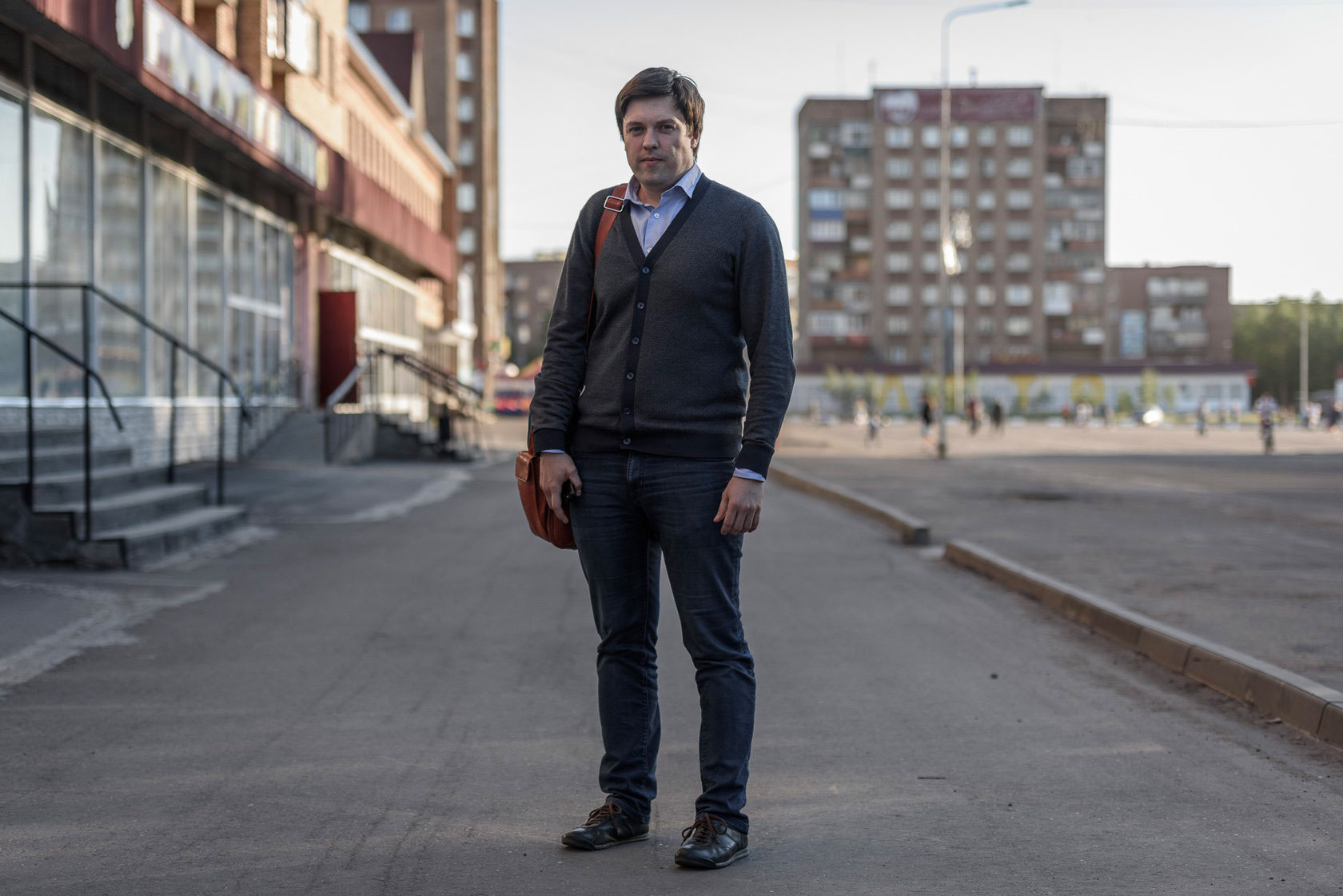
Chain of fall
In 2017, the mine was idle for almost six months, and the city immediately felt it.
«As soon as the mine became unstable and payment troubles began, first of all it was felt by the city budget, because the tax on incomes of individuals in former volumes ceased to сome. Contributions to funds have decreased. Add to that a low collection of payments for housing and communal services, discontinued payments of alimony — the town lost ground,» says the town hall employee. «Even when in December of last year people were paid their salaries and began to pay steadily, the income of none of the businessmen increased. The communal workers will confirm that the utility expenses did not increase. I know one family, which instead of paying off debts, bought a car. People are waiting for the inevitable and do not want to pay the bills.»
The suspension of Intaugol affected other enterprises. Heat supplying organizations soon realized that no coal would be delivered. If Inta coal cost 1.5 thousand for a ton, then imported — 3-4 thousand. Intinskaya CHPP had to be rebuilt. It never had a warehouse — the coal was brought by the cars, unloaded and sent to a furnace. And now we needed a non-reducible stock of 10 thousand tons — provided a special platform. Small boiler houses had the hardest times, so the republican commission for the liquidation of emergency situations in late 2017 decided to allocate about 38 million rubles from the reserve fund — only to make small boiler houses continue working in the middle of winter.
Specialists in the town hall forecast that this situation can happen again this year, because all tariffs have already been approved and no one will change them — in fact, the republic will compensate the expenses of the heat supplying organizations of Inta.
Constant defaults of Intaugol caused damage not only to heating companies. To divide coal into fractions, the company needs a lot of water, so Intaugol was the main consumer of water supply company Vodokanal, and the liquidation of the mine will inevitably lead to a decline of workers in this utility.
Despite the fact that Kapitalnaya has long been closed, the headgear has remained, and now this structure is the highest in the city, more than 90 meters. It is Kapitalnaya which pumps water from under the ground, so it does not flood other mines. Liquidation of Intaugol will lead to the fact that pumping out the water will no longer make sense — the water will naturally flood Zapadnaya, Glubokaya, the Kapitalnaya itself and, of course, Intinskaya.
At the same time, both the town hall and the operational situation headquarter that makes decision to liquidate Intaugol, are sure that the dependence of the town on the single mine is exaggerated, and Inta will continue to exist, as before.
The town is not a barn to put a lock on it, metaphorically states the Inta citizen Nikolay.
Services sector
The cafe, where we met with an employee of a municipal institution, was opened six months ago. Across the street, the bistro started working recently. The woman is surprised that in the town where everything is closing, new eateries appear. Kirill says that this is a kind of law of the economy: the more complex and critical the situation in the country or city, the more there are pubs with alcohol and food places. I object: in towns where people have problems with money, the business idea of opening another bar looks stupid. Only pensioners and state employees are able to pay in Inta, and not even all of them.
«Do not think that after raising the minimum wage, everyone gets a lot. Only those state employees who had federal funding were happy. The minimum wage was raised, the May decrees are executed. But in fact, people are transferred at half-pay, at 0.3 fte, at 0.2 fte. It’s everywhere. Education is a mess, more and more cuts, people are kicked out under any pretext. And in medicine the same thing. But they keep it quiet at the official level; the head physician, the director will not say anything.»
«The city lacks any development logic. Everyone knew that it would be the end of a mine, but at the same time a huge shopping center building was being built — who would go there?» the interlocutor is wondering.
According to her, the population was divided into two parts — optimists and pessimists. The first say that nothing terrible has happened, the latter predict that first Inta will become a settlement, and then completely shrink to a village.
«The liquidation of Intaugol was logical. This was known in November 2017 — before promising federal money. There was already talk that it was not for long, that everything would be over quickly. But still people responded to this message uneasy — everyone had to make a difficult choice: either go somewhere to work, or sit half a year on welfare. It is also difficult. Women already occupy low-paid positions, so the husband in the family is the only breadwinner. Many hoped for a resettlement program, and now people began to realize that it actually does not exist, that it does not work. Of course, some have spare options — to move. They are calmer. But there are not many of them,» the woman says.
She believes that the closure of Intaugol will gradually affect all areas of the city life, but immediately adds that in recent years the enterprise has not influenced the economy of Inta.
«People no longer believe in local, republican, or federal authorities. But no one will protest or even organize any actions. Now the main protest is on the Internet. Read the local publics. And when you walk around the city — it’s calmly, infantile. As if nothing had happened.
People no longer believe in local, republican, or federal authorities. But no one will protest or even organize any actions.
We meet with businessman Yury at his office. He says he survived three or four mayors, but recently he had to close two sales points, now there is only one left.
«I’m the same as any other resident. Yes, I am worried. No, I do not like it. No, I do not know how this will end. Yes, this is bad. But I do not influence the situation. I get some information from the Internet, some — from the TV. I worry, because fewer people will come to me as an entrepreneur. Everything is squeezed. Plus misunderstanding of the administration — as if it is not working for development, but as if…» he ends the sentence vaguely.
In his opinion, there are no points of growth for the local economy. On the contrary, so far everything is being closed — a kindergarten, a poultry farm, a school, a mine.
«There is no demand and there is no desire to develop something. Because where to invest? I’m a businessman. I live by people, income. And the more shops, the more comfortable it is to live in our town. I’m a native, I want to live and work here. But it is difficult. Although hope dies last. I’ll be patient. And I’ll catch the last ride. If I were 20-25 years old, I would gather the backpack — will be there soon!
Free access
At the height of the working day, the enterprise does not look working: there is no noise typical for industrial giants, there are no smoking pipes and working conveyors, a single tractor gives the appearance an active traffic. There are also few people near the administrative building Intaugol. Several people come from the bus, pass parking with a dozen cars and walk into the massive doors. A man with papers walks out of the door and walks into the nearby hangar. From there appears another man also holding some sheets. They do not look like miners at all. Where are all these thousands of workers who are waiting for dismissal? It is unknown.
The territory of the enterprise is not fenced off at all — one can safely walk towards the concentrator, go to the main building where the miners gather to go underground, to look into the open doors of the hangars and other production facilities. Prohibiting signs are nowhere to be found — no admittance only to the certain structures.
Rust, flaky paint, decrepitude and dirt, under the flaming sun temporarily imitate the dust — all this creates a picture of total decline.
At the entrance to the main building there are no watchmen or turnstiles. Apparently, they do not know anything about the access system.
«If you have a flashlight and a helmet with you, you can go down to the mine — nobody stops you and asks nothing,» the employee familiar with the situation describes the security system at the enterprise.
Optimist
Lyudmila Sinkevich is a master of the site of an administrative and domestic plant, she is responsible for all administrative buildings. She is sure that the closure of the mine will not greatly affect Inta — the town will continue to live the way it lived.
«I’m from this town, I love it. And 1200 people, who are being cut, — well, it seems to me there is nothing to worry about. The city will survive. Someone will come, someone will work: we have crazy deposits. Manganese, for example.»
The city will survive. Someone will come, someone will work: we have crazy deposits. Manganese, for example.
According to her, the collapse began in the 1990s. When everyone said that the mine is at risk of closure, she replied to colleagues that the enterprise would hold on for another 20 years. And five years ago, she told everyone that the deadline was 2019. And it happened. She worries that there are no good specialists — they ran away. And their place was taken by the youth without experience and skills, which must be taught. But there is no basis for this: there used to be a training factory where specialists were trained, but then they closed it.
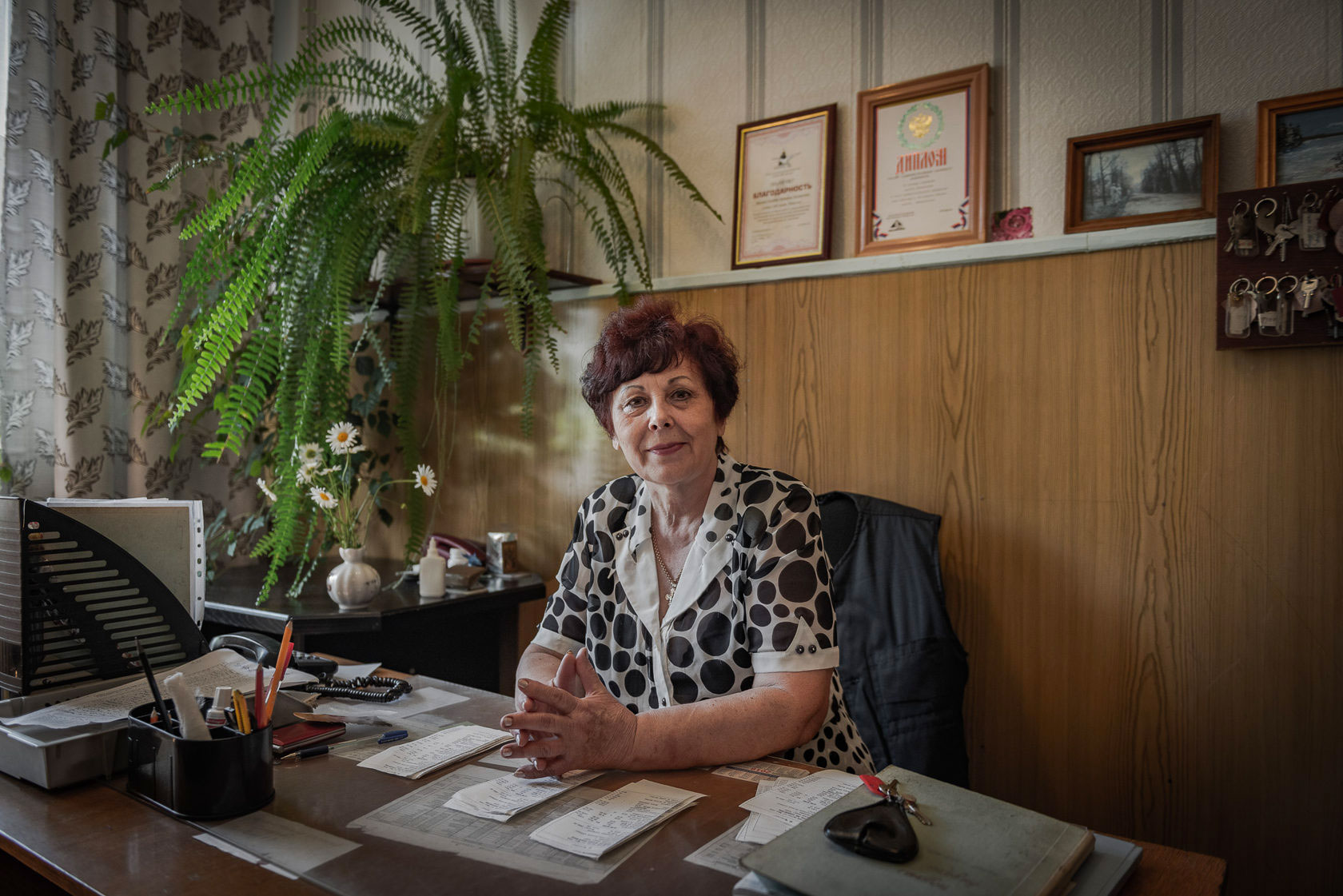
«Well, the 20-year-old boy comes, of course, he does not know how everything works. And we basically have men who are handy, heady — they will make candy out of nothing. It comes with time. It’s a pity the old people left,» Lyudmila continues. «Everyone knew perfectly well that it would be that way. The enterprise was unprofitable. Well, what can you do? No one will work at a loss. In the newspapers I read: this was the cost, we sell it cheaper, at a loss. Well, why? I’m not buying a ragged dress for three thousand, just to patch it? It is obvious. I have been working at mine for 27 years. Of course, I feel sorry. I feel sorry for my labour.
Lyudmila honestly admits that she is an optimist. In her version of life, the kindergartens are not closed, but staffed, the staff is not cut, and treat the economy of the enterprise in a businesslike manner.
«Of course, there are all sorts of conversations. Everyone is negatively predisposed. There are some who all foment. I can not stand it. Tell me directly, express your opinion: in the newspaper, on the Internet. And in an underhand way — it’s a nonsense. Everyone wants to move to the southern regions, everyone expects money. How it works here: give, give, give. But most people who understand the situation, understand that everything is correctly done. Even if I do not work — I’m a pensioner, then I’ll do public work: I’ll run there, I’ll go in for sports, I’ll take part everywhere. I believe that you can live.
Lyudmila says that the received much more republican and federal money with Titovets than with Smirnov.
«I do not want to say anything bad about Smirnov or Titovets. He was a master, maybe he did not understand much, maybe he was illiterate somewhere. And Larisa Vladimirovna is much more literate than him. He spoke straight from the shoulder. He was a plain fellow. With him everything was done, and with Titovets everything is done.
Excursion
Inside the main building it is clean —there are women who wash the floors, windowsills and walls everywhere. Apparently, this process is permanent and never ends.
On the second floor you find yourself in a kind of atrium. The hall with many open doors, from which people come and go, is a monument to the Soviet office. As if you were back to the mid-1970s. Kirill is struck by this discord: he imagines how miners go up from the tightness of the mine and suddenly find themselves inside a spacious room with an unattainable ceiling and light penetrating through the upper windows.
We are accompanied by a middle-aged woman who did not mention her name. She, like many, regrets the closure of the enterprise, in the hall of which once joined the pioneers. She shows where the miners change their clothes, where they wash after the shift, where they sit and smoke. In the room where the work clothes hang, there was a fire due to the heater, after which they made repairs. The results of repairs are imperceptible — the old tile, the walls painted in dull colors, rubbed floors, twilight in the corners, inaccessible to the sunlight, which comes through the open window sashes.
She still considers Smirnov a good leader, who always worried about the mine, and justifies him: that money was planted and the amount was small. With him, it never happened that the employees of the Intaugol did not get paid, even in times of crisis. A woman treats Titovets with suspicion: she is «only engaged in concerts», and badly speaks about the head of the republic Sergei Gaplikov, who once at some city event argued to the question about miner’s money.
In a smoking room
In a smoking room on the second floor there are two massive wooden benches — like in Soviet parks. Someone is always sitting there: some smoke after a bath, others are waiting for an assignment. When I ask about the closure of Intaugol, some stay silent — they do not want to answer anything.
«Thank God that they are closing. I have been working for 35 years. I do not go to the mine anymore, I work on the surface. The mine is a garbage dump,» says one solely.
The mine is a garbage dump
«How can an enterprise be a city-forming if everyone gets money, but they did not pay us a penny? We did not receive anything for almost a year. And the city survived. Nothing was invested, the equipment is old,» adds another.
«60-70% of our citizens are pensioners. They do not care what happens. Many have children in the midland, they will help or take their relatives home. The town will not be completely closed, but there will be a mess. No certainty,» says Denis.
He has been working as a shaftman since 2014, got a job at the mine right after the army. Now he thinks what to do next. There are few options: to go to Vorkuta, or as a rotation worker to other enterprises, or to retrain to a guard, slinger or welder.

Mining worker Omar believes that no one in the city does not worry about the future. He says that some initiative group is already preparing an appeal to President Putin — last year, according to him, it helped, the company got 1.2 billion rubles. Perhaps, this time something will also come out.
«The mine can still operate. But they offer Vorkuta. Who is waiting for us there? Did they think about the people who live here? About the families? Families also fall apart: relatives here, and the man works there. For months. How would he visit? At the weekend, or what? This is also an adventure — to go there. There are such medical commissions — like for cosmonauts. Maybe, you will pass in the first year. And then they will not take you,» he says. Omar is already retired, but he is not sure he whether he can live on his pension. He has not yet decided what to do next.
They offer Vorkuta. Who is waiting for us there?
Mining worker Vitaly adds that the liquidation of the mine will lead to the closure of other enterprises and the reduction of people. And many will leave Inta because of this.
«Everyone applies for jobs in Vorkuta, someone elsewhere. It’s good that this job was offered. But here it will be unreal to get a job. My personal feelings, and by talking with others: everyone expects the end of this town,» he concludes.
They only have a couple of days of work left — in mid-July, the mine stopped mining coal.
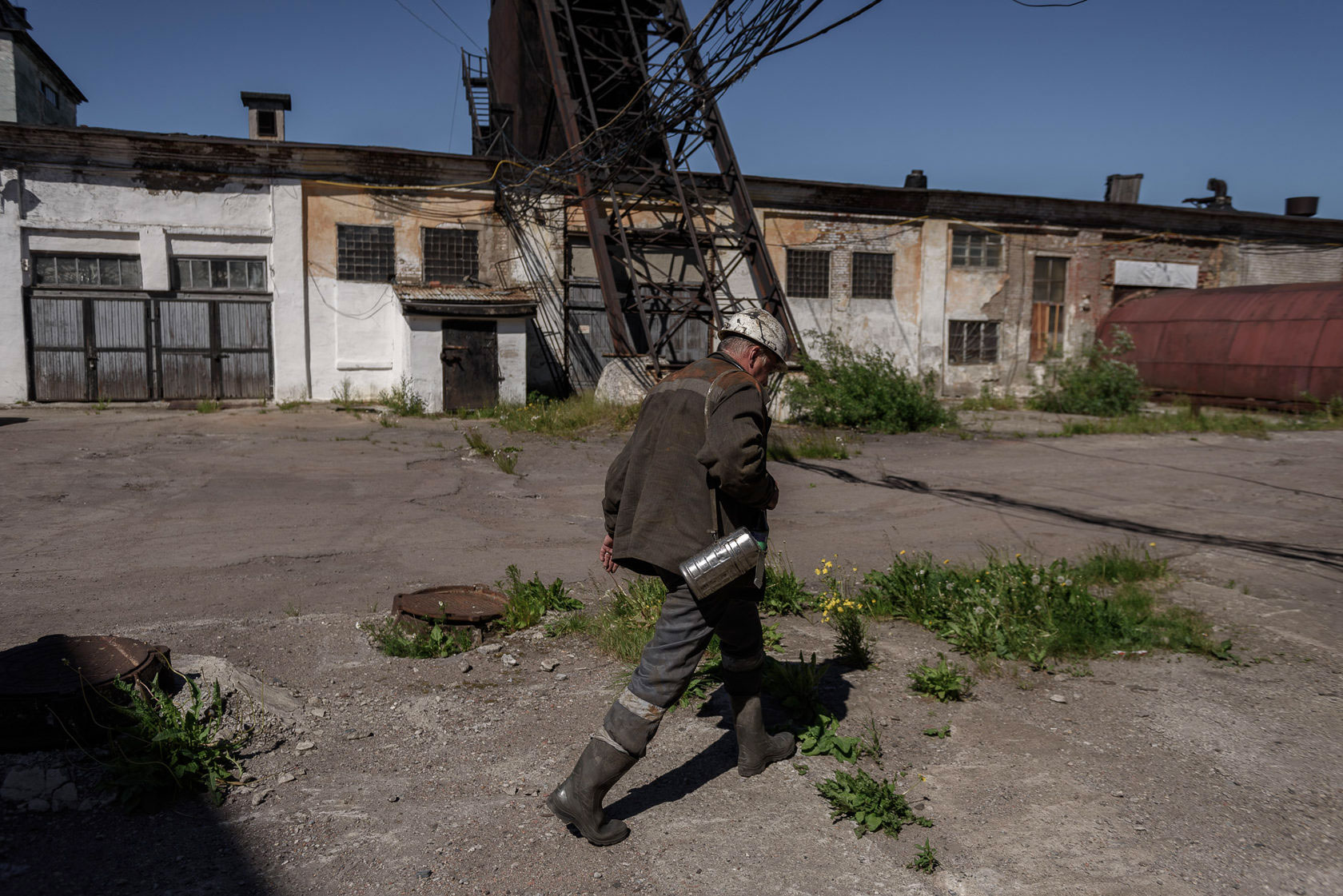
Prospects
According to the operational headquarters, more than 1.1 thousand employees of Intaugol have already received notice of a reduction. The process of releasing the staff will last until October 9, after which the work on the mine conservation will begin. A small group of former specialists will be engaged in liquidation activities.
The company’s employees were offered 1,500 vacancies. Miners are offered to move to Vorkuta or to other cities with divisions of Severstal, to Yakutia, where they could get a job at a coal mining company Kolmar, to the Belgorod region. 159 people have already chosen a further career, filling in questionnaires and writing applications. Of these, 89 are going to work on Vorkutaugol and the Northern Diamond Company, eight at the Yakovlevsky Ore Mining and Processing Enterprise in the Belgorod Region, seven in the Intinsky Department of the Ministry of Internal Affairs, three in the extractive company Bauxite of Timan, one in the SIBENCO-Kuzbass. Another 51 people plan to find a job in Inta, other Komi cities or go to the middle zone of Russia.
Every time it’s a personal strategy, a personal trajectory. People express different opinions. Vorkutaugol is only one of the scenarios. Someone wants to move to another place, to another subject of Russia, but on the same specialization. Someone just wants to move, looking for another job. Someone wants to stay in Inta. Someone is ready to stay in the republic. Now the Ministry of Labor, Employment and Social Protection of the Komi is working on all applications,» says Ivan Kostornov.
According to him, Vorkutaugol will be able to employ 300 people — the operational headquarter looks up to such a minimum amount, but it is sure that more people can be helped. The company and the republic promise that all those who wish to change the city will help to solve the problems with moving and housing.
This year, Inta plans to obtain the status of the territory of advanced socio-economic development. The government of Komi and the town hall hope that this will help attract investment in the town’s economy. The Komi socio-economic development project until 2035 states that it is possible to extract and process natural gas in the Inta district, convert coal into liquid fuel, produce manganese alloys, fused phosphates, open an asphalt plant, a dietary center of the North, create a poultry complex, a meat and dairy farm, department of a deep meat processing.
Officials expect that, according to the federal draft of the Northern latitudinal route, a transport hub will appear in Inta in 2019-2022, which will give approximately 700 new jobs.
They also do not give up the idea of gold mining at the Chudnoye deposit, the territory of which is part of the national park Yugyd va. This project was actively promoted by the previous Mayor Pavel Smirnov, but he faced opposition of environmentalists.
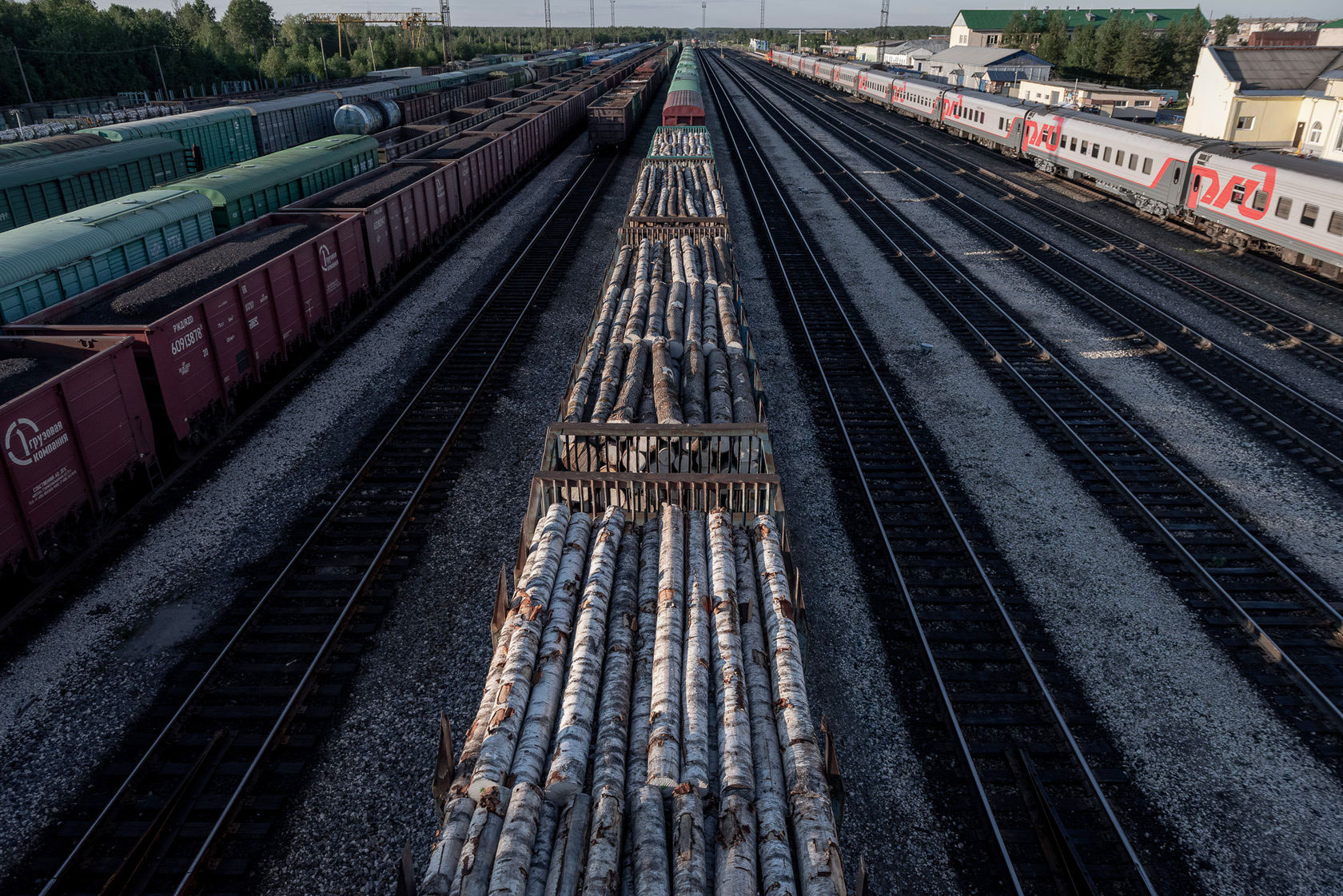
«In those places, gold was extracted in the 1970s and 1980s, after which a lunar landscape remained there — huge areas of dug up land. And this territory was specially included in the national park, so that others did not covet it. Left for better times. Smirnov wanted to separate these sites from the national park and give Yugyd va the sites two or three times larger in another place to start mining gold and rock crystal. But it did not work — the court banned it. And there is a whole mountain of gold, 500 meters deep. Reserves are still not explored to the end,» says the local ethnographer.
He believes that it is possible to expand mining of rock crystal. It was actively developed during the Soviet era. Citizens tell that portholes in the ship of Yury Gagarin were made of rock crystal. The local historian believes the Inta quartz deposit to be one of the best in the world.
According to the director of the station of the young naturalists station Vasily Petrov, now everyone bet on oil and gas, and coal is taking a back seat. But burning coal, in his opinion, is a crime, because you can do more with it than with oil.
«They started with oil refining, it was more important than production. And what about coal? The most important thing is to get it, not to recycle it. So, if there were a couple of processing plants, then the miners“ general directors would just hang themselves — they would not allow it. The entire chemical industry sits on the coal. But what will the government do? It is now engaged in gas and oil, because it’s easier to get money right away,» he explains.
Vasily Petrov is sure that the coal industry in Inta is not over. This is what other interlocutors hope for. According to one of the workers of the city administration, Intinskaya, of course, is conserved, and the groundwater will flood the mine, but when a new investor, perhaps, even a foreign investor comes, he will build a new mine and resume the extraction of the Inta coal.
This story is originally posted on the 7x7-journal.ru and re-published as part of Eyes on Barents, a collaborative partnership between media organizations and bloggers in the Barents region

